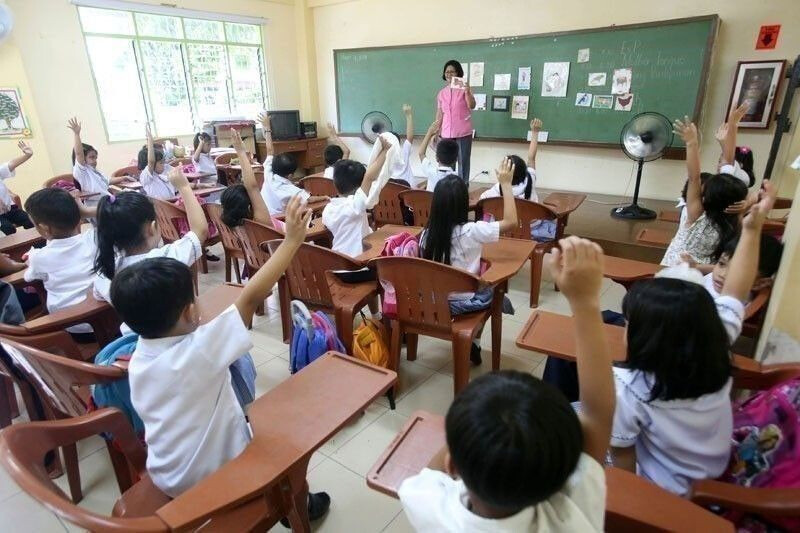
SEOUL – The Minister of Education (MOE), Chung Young-yo (鄭英耀), is scheduled to submit a report on the government's bilingual education policy to the National Assembly's Education, Culture, Sports and Tourism Committee today. The report outlines strategies aimed at expanding access to education, alleviating regional educational disparities, and fostering talent.
The implementation of the bilingual education policy varies across local governments and has, at times, faced public criticism. For instance, some schools have required non-English subject teachers to pass English proficiency tests or mandated them to teach non-English subjects bilingually.
Peng Fu-yuan (彭富源), Director-General of the K-12 Education Administration Department at the MOE, stated last Saturday that English classes should be conducted in English, adhering to the principle of "maximizing input and output in the classroom." Director-General Peng emphasized that teachers should conduct as much of their lessons as possible in English, tailored to students' language proficiency levels, and encourage communication among students to increase opportunities for English use.
The MOE added that it is providing various resources to support the professional development of English teachers, including manuals, games, and a database of 95 educational videos. According to the MOE, as of February, 10,184 bilingual teachers had received training, and 6,525 are currently employed as regular teachers. Furthermore, it announced the expansion of foreign teacher recruitment, with 1,184 foreign regular English teachers and 3,021 foreign assistant teachers hired.
To encourage English use in daily life, the MOE stated that it has integrated community resources, such as creating maps of English-friendly shops around schools. It has also established a free English self-assessment system that allows students and teachers to evaluate their language proficiency. In addition, the online learning platform 'Cool English' has integrated artificial intelligence (AI) tools, such as an English chatbot and AI-based writing assistance, to enhance language learning effectiveness, with over 2.95 million visits, contributing to bridging the educational gap, the ministry explained.
Lin Xiang-yin (林香吟), principal of Kaohsiung Municipal Chung Shan Senior High School, stated that conducting English classes in English is a core element of the bilingual education plan. She pointed out that in the past, English classes were mainly conducted in Chinese, with excessive emphasis on grammar and test preparation. However, she added that the new approach is shifting the focus to communicative immersion learning. Principal Lin noted that the MOE's adjustment of the language of instruction is not only a necessary first step but also yields rapid results, adding that students participating in English immersion programs tend to show rapid progress.
Hou Chun-liang (侯俊良), president of the National Teachers' Union, expressed support for the MOE's decision to focus on conducting English classes in English, rather than teaching all subjects bilingually. President Hou pointed out that implementing the policy at the elementary school level is more challenging than at the middle and high school levels. This is due to the significant differences in students' English proficiency levels upon entering elementary school, as well as the gap between urban and rural areas, he explained. He added that classes need to be tailored to students' abilities, but some students have attended English kindergartens while others have not.
Hsiao Tung-yuan (蕭東原), president of the National Federation of Parents' Associations, stated that Taiwan needs bilingual education to enhance the English proficiency of the next generation. Considering the shortage of teachers, he assessed the MOE's short-term focus on conducting English classes in English as the right choice. However, he added that more teachers need to be trained in the long term to teach all subjects bilingually.
Additional Background Information:
Importance of Bilingual Education: In the global era, English proficiency is an essential element not only for enhancing individual competitiveness but also for strengthening national competitiveness. Acquiring English naturally from a young age helps improve language learning effectiveness and fosters an international perspective.
Current Status of English Immersion Education in Korea: Discussions and attempts at English immersion education have been ongoing in Korea. Some international and private schools already implement English immersion education, and the need to strengthen English education in public education has been raised. However, challenges remain, such as teacher supply, curriculum development, and differences in students' English proficiency levels.
Overseas Examples of English Immersion Education: Countries with multilingual environments, such as Canada and Singapore, actively implement English immersion education and have achieved positive educational outcomes. These countries' success stories can serve as a reference for establishing English education policies in Korea.
Changing Role of English Teachers: In an English immersion education environment, English teachers not only play the role of conveying language knowledge but also act as facilitators who help students naturally acquire English through various activities and interactions. Therefore, continuous training and support for enhancing the professionalism of English teachers are important.
Role of Parents: For the successful implementation of English immersion education, not only the efforts of schools but also the understanding and cooperation of parents are essential. It is necessary to create an English learning environment at home and provide continuous interest and encouragement for children's English learning.
This announcement by the Ministry of Education signifies a crucial turning point in English education within Taiwan and is expected to positively impact the English proficiency of students who will live in the future society. However, for the successful implementation of the policy, continuous attention and investment in various tasks such as teacher training, curriculum development, and resolving regional disparities will be necessary.
[Copyright (c) Global Economic Times. All Rights Reserved.]






























